Overview
The tech space continues to surprise and baffle the world with its ground-breaking developments. A prime example of this is the no-code/low-code movement shaking the industry today. The world is barely able to absorb cutting-edge innovations from this sector before another is dished out. It seems just when people are starting to recognize the indispensability of programming and coding practices, a new movement has been awakened and is one that makes coding seem primitive.
The no-code/ low-code movement was designed (just like most innovations) to make people’s lives generally easier and without tedious technicality. No-code does exactly what it says, abolishes coding practices. This does not, however, signify the end of an era for the programming sector but instead allows individuals to carry out some basic activities that could, before, only be performed by experienced programmers.
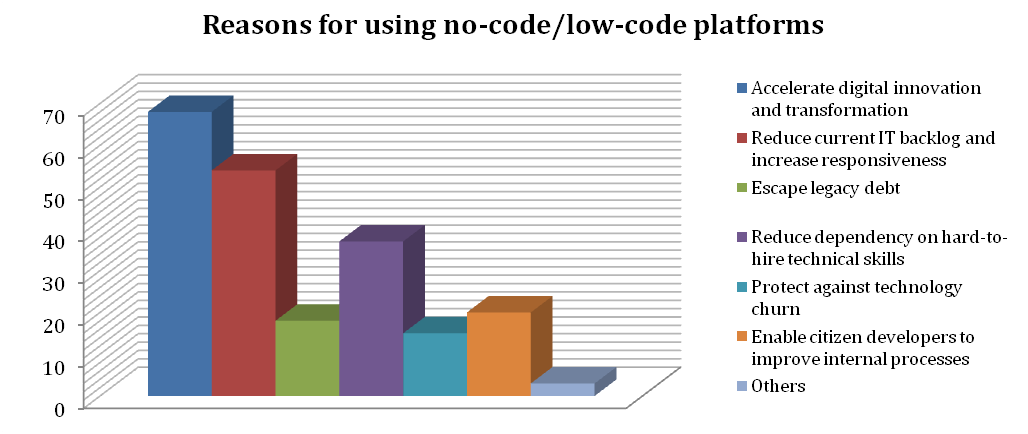
Insights and application of no-code/low-code platforms
The chart above shows the most common reasons for the adoption of the no-code/low-code movement. These platforms are used today to accomplish tasks such as designing full-scale websites (like WordPress), building applications, games, and many more. No-code applications can also be generated for procedures, requiring simple programs to streamline operations like delivery management, inventory management, and employee onboarding. These applications can leverage pre-built features to collect information, track progress, and report against targets or project milestones.
However impressive, no code and low code solutions are not a direct substitute for large-scale enterprise-level software development. There are no businesses in highly regulated industries looking to create scalable mobile apps using AppSheet for example. These intelligent no-code/low-code platforms are affordable, flexible, entry-level frameworks that satisfy the common needs of an application set. In essence, they create economies of scale for the provider and flexibility and price benefit for the business customer.
Notable no-code/low-code companies in the tech space
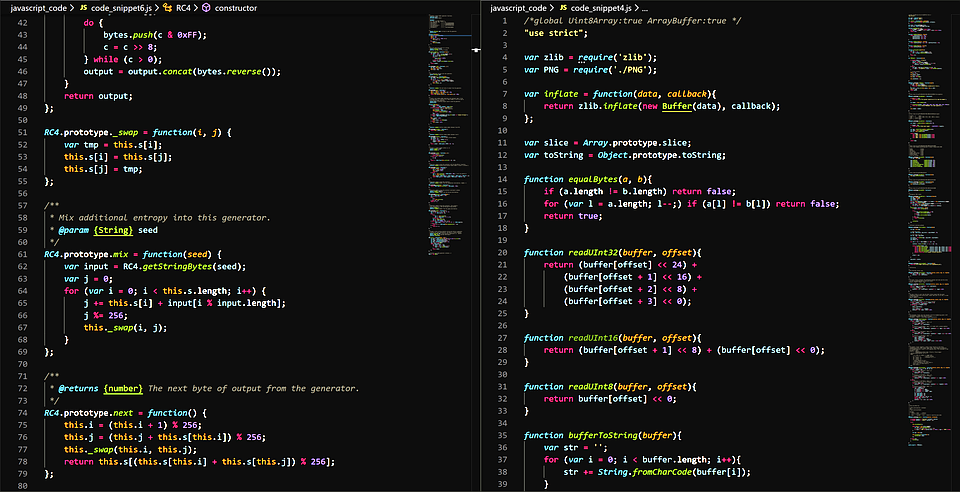
Armed with information on the no-code/low-code movement, let’s see some notable, promising startups making waves in the industry.
Airtable

Airtable is a cloud-based software company that provides an easy-to-use online platform for developing and deploying relational databases. It brings the database out from power users and into the mainstream, developing a new type of flexible but sophisticated productivity instrument that can be used by all. The platform also helps organize ideas or collections, build flexible checklists, and manage users. Airtable offers various templates ranging from home improvement to store inventory, empowering users to develop custom apps without any prior coding experience.
Highlights
Founders: Andrew Ofstad, Emmett Nicholas, and Howie Liu
Date of Incorporation: 2013
Headquarters: San Francisco, California, United States
Funding Amount: US$ 617.6 million
Funding Status: Series E
OutSystems
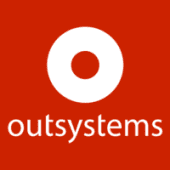
OutSystems is a low-code platform that empowers businesses to build, manage, and deploy enterprise-grade applications. The modern application platform’s connected, high productivity, and AI-powered instruments help developers to innovate via software. It also allows organizations to build applications that deliver workplace innovation, transform the customer experiences, automates processes, or modernizes core systems quicker. They accomplish this by combining the power of low-code solutions with advanced development capabilities, enabling visual development of entire apps that conveniently integrate with existing systems.
Highlights
Founders: Paulo Rosado and Rui Pereira
Date of Incorporation: 2001
Headquarters: Boston, Massachusetts, United States
Funding Amount: US$ 572.1 million
Funding Status: Series E
AppSheet
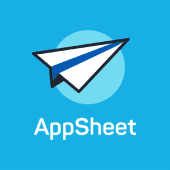
AppSheet is an intelligent no-code platform designed for business apps. The platform empowers business users to leverage their business data and create powerful, code-free applications. AppSheet rapidly generates a working application that can be enhanced, customized, branded, and deployed. The apps can be rich in function (machine learning, offline access, workflow rules, and more) and run on the web, Android, iOS, and messaging platforms.
Highlights
Founders: Brian Sabino and Praveen Seshadri
Date of Incorporation: 2012
Headquarters: Seattle, Washington, United States
Funding Amount: US$ 18.5 million
Funding Status: Series A
Appian
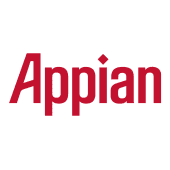
Appian provides a low-code software development platform that allows companies to quickly create unique and powerful applications. The apps built on Appian’s platform help organizations drive competitive differentiation and digital transformation.
Highlights
Founders: Marc Wilson, Matthew Calkins, Michael Beckley, and Robert Kramer
Date of Incorporation: August 17, 1999
Headquarters: Reston, Virginia, United States
Funding Amount: US$ 47.5 million
Funding Status: Series Unknown
Conclusion
Having risen in popularity in the last decade, no-code/low-code development platforms offer exciting opportunities for companies and businesses to develop apps, games, websites, and programs that meet their requirements without having to set up an in-house team of software engineers. Due to the technical difficulty of advanced programming solutions, Gartner (a world-leading research and advisory company) projects that by 2025, over 65% of all app development will be carried out on no-code/low-code development platforms. Although the modern no-code/low-code landscape is in its infancy, it displays an unparalleled potential to revolutionize the tech industry in a matter of years.
For more extensive analysis and Market Intelligence reports feel free to approach us or visit our website: Venture Capital Market Intelligence Reports | VCBay.
We try our best to fact check and bring the best, well-researched and non-plagiarized content to you. Please let us know
-if there are any discrepancies in any of our published stories,
-how we can improve,
-what stories you would like us to cover and what information you are looking for, in the comments section below or through our contact form! We look forward to your feedback and thank you for stopping by!
Next Article


































[…] Emerging Trends: The arrival of the no-code/low-code movement […]
hi,
Very nice blog, you have done here. So keep it up and help the visitors.
keep sharing and keep posting.